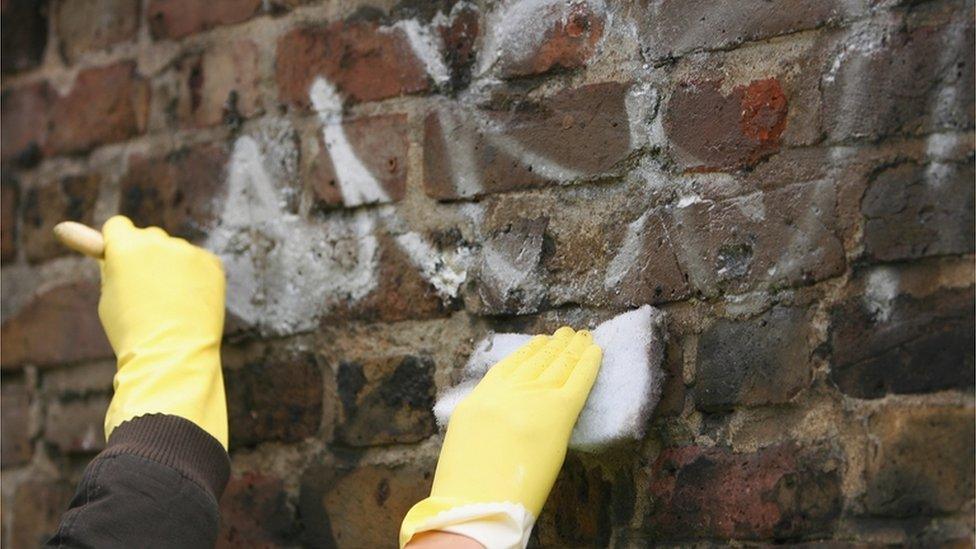Huge backlog in offenders doing community payback in Scotland
- Published
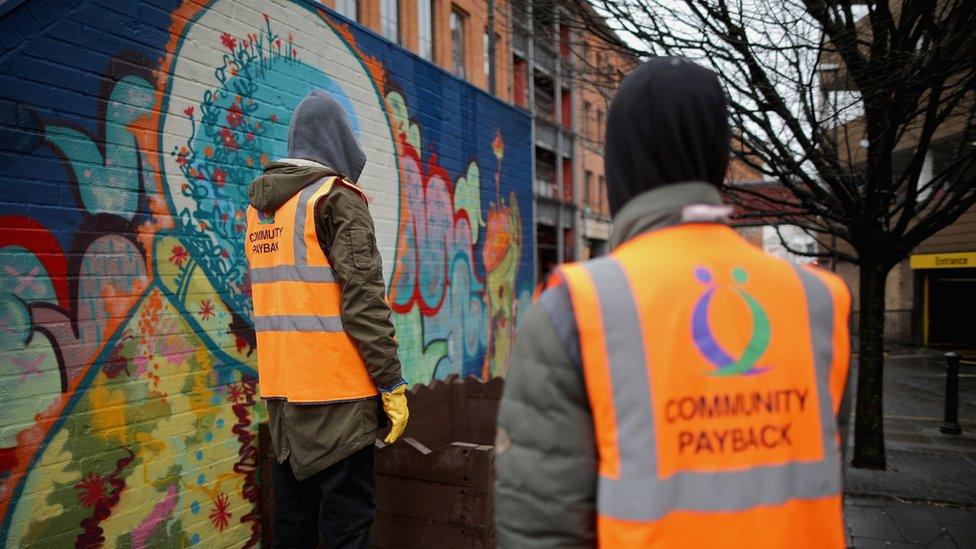
Unpaid community work can be used as a sentencing alternative to prison
The backlog of unpaid work that offenders in Scotland need to carry out has risen to more than 700,000 hours, figures obtained by the BBC show.
Sheriffs can sentence offenders to unpaid work for a wide range of offences as an alternative to prison.
But Covid restrictions meant many offenders were unable to complete their community payback hours.
More than 250,000 hours of unpaid work were written off but backlogs have returned to almost the same level.
Experts say local authorities are struggling with staff shortages which are restricting the ability to supervise offenders.
They add that attempts to clear outstanding court cases mean even more people are being sentenced.
Justice Secretary Keith Brown said the Scottish government did not see it as a backlog, saying it was "pretty much business as usual".
He conceded there were workforce pressures but said the hours would get done and that the government had invested an additional £15m in community sentencing across 2021 to 2023.

The Scottish government said it was encouraging more "community-based interventions"
The Scottish government has made community sentences and alternatives to prison a priority - citing research which says they are far more likely to reduce reoffending and help rehabilitate offenders than time behind bars.
Earlier this year the justice secretary made clear the need for reliable and consistent community sentences.
But the BBC has found that the backlog in hours of unpaid work, the main element of Community Payback Orders (CPOs), has almost returned levels at the height of the Covid pandemic.
In January 2021, the Scottish government had to introduce controversial emergency measures to make cuts to the number of hours of unpaid work done by offenders to tackle the growing backlog.
The justice secretary reduced the unpaid work element of CPOs by 35% for all cases except those involving domestic abuse, sexual abuse and stalking.
At the time, it had been predicted there would be more than one million hours of unpaid work outstanding by the summer of that year if nothing was done.
Despite about 250,000 hours of unpaid work being written off, the backlog has risen again to almost the same level.
CPOs can include a range of measures including supervision, drug treatment and unpaid work.
The unpaid work element is often seen as a way of paying back the community harmed by the offence and has traditionally involved painting public spaces, clearing wasteland and cleaning off graffiti, as seen in the BBC drama The Outlaws.

BBC drama The Outlaws follows strangers from different walks of life who are forced together to complete a Community Payback sentence
Social workers say they have been working with ministers to reduce the backlog but say some areas are struggling to recruit and retain staff.
On average people are given around 130 hours of unpaid work to do. In March 2021 there were 14,300 CPOs in force in Scotland.
Experts say the backlog is building partly because of a shortage in social work staffing and partly because of the bottlenecks created in the criminal justice system as a result of Covid.
Karyn McCluskey, head of Community Justice Scotland, said people wanted swift, visible justice for both victims and offenders.
"The longer it goes on it is like the sword of Damocles over your head," she said.
"You want to be able to complete your sentence quite quickly."
Academics say there are concerns about the human rights of offenders waiting too long with the punishment hanging over them.
Community sentences are meant to be finished within the time period given by the sheriff - perhaps one year or six months.
If they can't complete in the time period that would be considered a breach of their payback order and they will be sent back to the sheriff.
Offenders can ask for an extension but have to go back to the sheriff to do so and again the experts say it means a breach is more likely.
Hannah Graham, senior lecturer in criminology at the University of Stirling, told the BBC there were workforce pressures and local authorities were finding it hard to recruit supervisors and organise activities.
She said: "We need to be careful that we don't have circumstances that lead to a perfect storm across a few fronts and we have backlogs in communities, we have a lot of people waiting in prisons and a system under a lot of pressure trying to cope."
Social workers say some local authorities are still running services as if Covid rules still apply.
They are running community supervision on a one-to-one basis rather than five to one, and not filling the mini buses as they used to.
There are also lots of people are still going off sick with Covid and they have lost lots of staff and are struggling to recruit.
There is a question of whether the Scottish government can or would write off people's hours again to try to get back to a manageable level.
The justice secretary told the BBC that would not happen.
Mr Brown said: "We intend to see these hours served and, of course, everyone knows the pressures on public services just now, but it's our intention to provide support to make sure those hours are served."
Scottish Conservative justice spokesman Jamie Greene MSP said the backlog was "in large part because the SNP's local government funding cuts mean councils don't have the staff to supervise offenders".
"This is an insult to the victims of crimes - and it's compounded by the justice secretary's shrug-of-the-shoulders response to the figures."
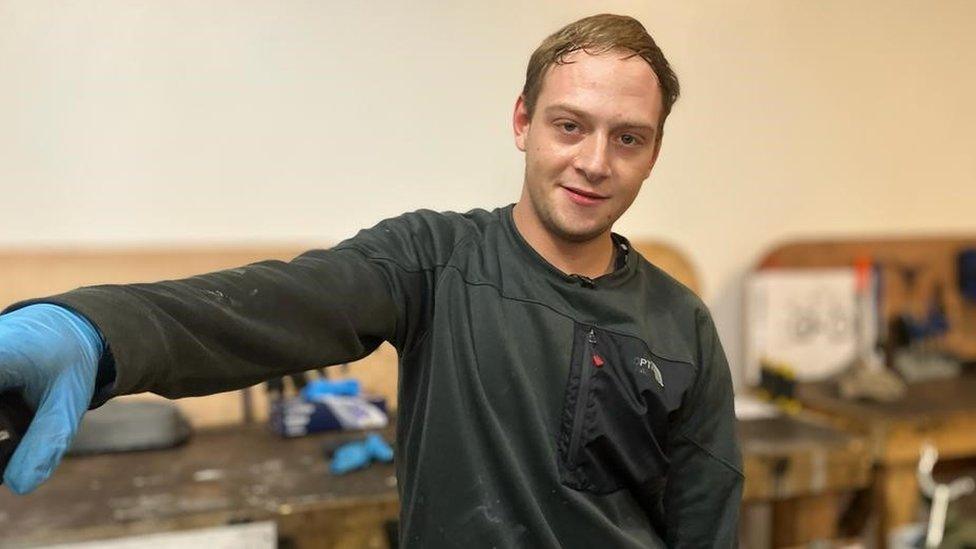
Chris Blair is serving his community sentence by repairing bikes which will go to Ukrainian refugee families
Chris Blair, aged 20, is serving his community sentence by repairing bikes which will go to Ukrainian refugee families and other people in need in North Lanarkshire.
He started his CPO within two weeks but the council has a current backlog of 56,000 hours.
"It was my first time ever doing it, so I was wondering what it was going to be like but it's good doing it because you're helping the community," he told the BBC.
He has a year to finish his order and then hopes to go back to his job doing landscaping.
"It feels good because you're helping people out and fixing their bikes and for them."
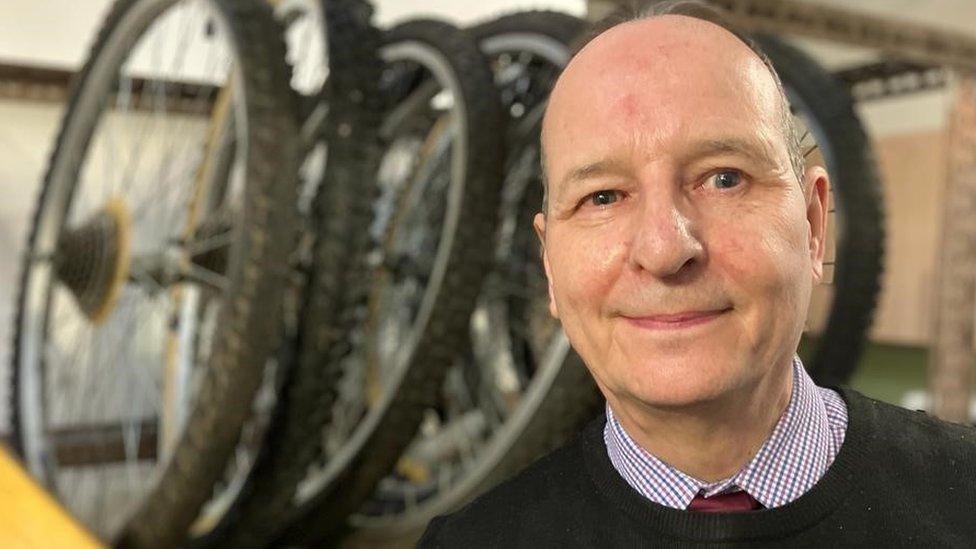
Gerry Ranachan said unpaid work was very effective but needed to be started quickly
Gerry Ranachan, senior education and families manager for justice services in North Lanarkshire Council, said unpaid work was very effective but needed to be started quickly.
He said the 56,000-hour backlog in North Lanarkshire was not good for service users or the reputation of community payback.
"It's something we are working towards reducing," he said.
"And because of the suite of opportunities we have in North Lanarkshire for service users to undertake unpaid work, that's not a significant difficulty for us."
Related topics
- Published11 January 2022
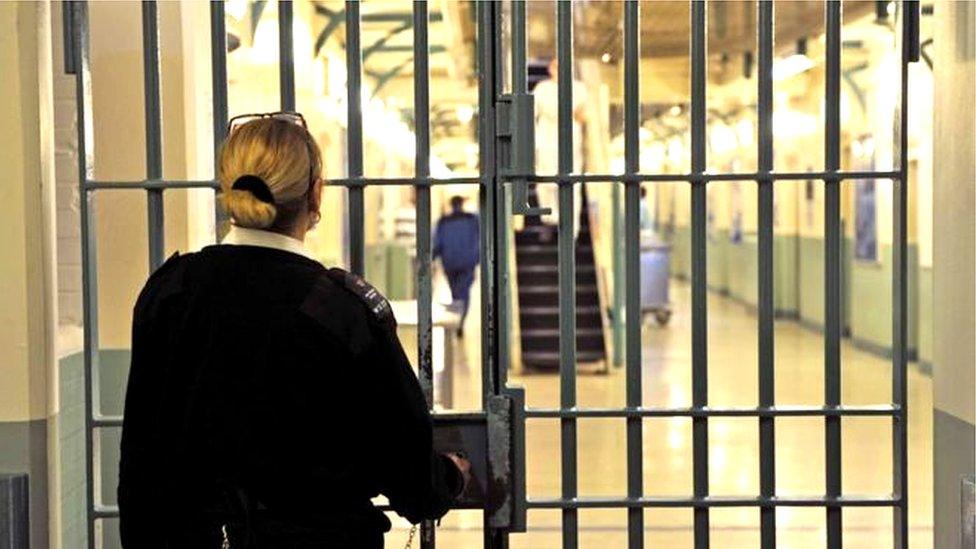
- Published15 July 2021

- Published6 February 2018
